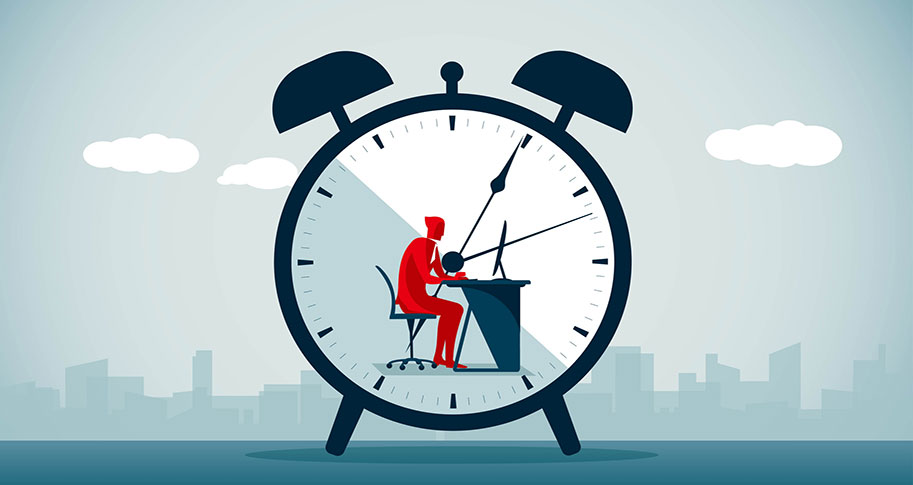
Hustle culture is a widely accepted societal norm that glorifies the idea of overworking for one specific goal: to achieve success. While work pressures and financial needs can contribute to this phenomenon, individuals wrapped up in hustle culture tend to overwork not merely because they are economically driven to, but because they believe this is the way to be a professional go-getter.
This culture promotes the belief that the “ideal worker” is someone who puts in long hours to achieve higher performance and prioritizes work over personal life, trying to demonstrate dedication and success. Many indications, however, point to the opposite, that working excessively long hours impairs both current and future work performance.
Hustle culture does not only impact seasoned professionals but those new to the workforce, as well. Workers aged 18 to 24 average more than eight hours of unpaid overtime work a week – an hour more than workers 45 to 54 years old and three more than those 55 and older. What’s more, in 2022 77% of people experienced professional burnout, causing 42% to leave their jobs.
Although the COVID-19 pandemic caused many to lose enthusiasm for this straining societal norm, organizations keep pushing for unhealthy work hours, and many employees keep succumbing to this pressure. It’s no wonder, as previous research has failed to unpack how working long hours negatively implicates performance and well-being.
Thus, “Peaking Today, Taking It Easy Tomorrow: Daily Performance Dynamics of Working Long Hours” by Walton College Distinguished Professor of Management Christopher Rosen (University of Arkansas) Lieke ten Brummelhuis (Simon Fraser University), Charles Calderwood (Virginia Tech), and Allison Gabriel (Purdue) explores the connection between working long hours, same-day boosts, and next-day plummets in performance. In doing so, the researchers also study the effects of working long hours on sleep and, therefore, on physical and psychological resources.
Rise-and-Grind
Over the past two decades, work hours have gradually increased in the United States, with the most desirable workers being seen as those fully committed and always available to work. Rosen says one reason for this increase may be that “work hours are consciously, or subconsciously, equated with higher performance – whether correct or not, it is often assumed that one can get more work done if one works more hours.”
There are certain jobs in which this is particularly true, including those lacking other clear performance indicators – knowledge work and managerial roles – those using “billable hours,” and those rewarding working long hours, evenings, and weekends with bonuses, promotions, and pay raises. According to Rosen, many supervisors and employees share the belief that working long days equates to performance boosts.
Unsurprisingly, this is far from the truth – and thank goodness, too. Rather, employees rely on after-work hours to recharge themselves in order to be energized for the next day and its tasks.
After the typical 9-to-5, people can turn their computers and professional brains off, decompress, and take care of themselves. The researchers, though, suspect that workers cannot sufficiently recover after experiencing increased hours, workloads, and job strain. Reducing their ability to psychologically – or physically – detach from work through sleeping, they will find their performance inevitably lacking the following day.
So, with a supposed paradox between workers’ motivation – or pressure – for excessive work behavior and the consequences of such, one question stands: although the intention is to improve performance, in what specific ways does working long hours harm employees’ future performance, instead?
Overworking = Underperforming
Although organizations persist in overworking their employees on the assumption that any harm that occurs will happen in the distant future, Rosen finds is detrimental to workers’ well-being in the short term.
First, employees will have higher same-day performance when they work more hours, investing resources that increase productivity during brief periods. Working long hours, however. negatively affects the length of sleep – recovery time – individuals are getting, impacting them the next day by increasing physical fatigue and reducing resilience to tackle tasks during the day. “Employees might find it particularly difficult to persevere in tasks after a short night of sleep,” Rosen said.
Employee resilience is also a deciding factor in how their coworkers rate their performance the next day; low resilience means a low-performance rating. Additionally, employees experience lower next-day performance because of these longer work hours and fewer hours of sleep.
Next-day performance does not directly change with increased physical fatigue, as meetings, deadlines, and caffeine may prevent physical fatigue from impacting performance. The authors acknowledge that this may only apply to knowledge workers, who this research studied, as their performance relies on attention, focus, self-efficacy, and resilience.
Ultimately, long workweeks will deplete physical resources, as employees have experienced impaired health, physical strain, and physical exhaustion. As for psychological resources – crucial for self-initiation, cognitive focus, and problem-solving – employees feel it impacts their eagerness and capability to act.
Work and Rest Cycle
Employees have finite physical and psychological resources to use while working, so rest after work is necessary for them to function ideally the following workday. The “Daily Recovery Cycle” demonstrates how this plays out for most people.
During stage one, employees work long hours and these efforts drain their physical and psychological energy reserves. Then, stage two takes place when the employee is off work, engaging in non-work activities, whether it be childcare, social engagements, leisure, or housework. During this stage, employees might recover post-work through activities like relaxation and psychological detachment, or they may not recover at all due to stress and responsibilities.
This lack of recovery means reduced sleep in stage three, a “universal act of recovery that people engage in on most days,” Rosen says, which is when individuals restore their physical and psychological resources. Finally, the start of the next workday is the fourth and final stage of the recovery cycle. If the individual’s state of readiness for the workday reflects their long hours and lack of recovery from the previous day, they will be in a low-energy state and unfit for high performance.
High workloads and stress influence chosen recovery activities, which affect the quality and duration of sleep. This poor sleep then affects the next day’s energy levels, experiences, attitudes, and performance level. Working long hours and not having enough rest time significantly diminishes our health and performance, both post-work and the next workday.
Fostering Well-Being and Future Performance
While working longer hours may temporarily boost productivity, it leads to physical fatigue and reduces sleep quality, impairing employee resilience, energy levels, cognitive functioning, and overall next-day performance.
The implications for businesses are clear: employees working longer hours may yield short-term productivity gains, but it severely impacts their health and performance over time. A balance between work hours and recovery is crucial to maintaining employee resilience and performance. So, organizations making informed decisions on sustainable work-hour policies and practices, as well as cultural changes to adjust employees’ view of overworking as a “desirable work practice,” could yield positive results, namely improved individual well-being and organizational productivity.
It may seem counterintuitive that working more does not automatically produce optimal outcomes, but there is a downside to working long hours over time. Working longer and longer hours may just be a short-term solution that incurs long-term costs that eventually have to be paid. And these costs may outweigh whatever short-term benefits employers and employees receive. Just as firms may have to change their culture with regard to work hours, employees could also benefit from understanding the importance of proper work hours, rest, and recovery time so they can control and mitigate the negative effects of working long hours.
 Alyssa Riley is a second-year graduate student earning her master’s degree in News
Narrative Journalism. Attending the University of Arkansas as an undergraduate student,
she earned her bachelor’s degree in News Editorial Journalism while working in numerous
writing, editing and social media roles. In addition to writing for Walton Insights,
she has begun a sports media internship with Hogs Plus Content Network and freelances
for Celebrate! Arkansas Magazine. After earning her master's, Alyssa hopes to work
in the magazine industry, specifically covering arts and culture, entertainment and
lifestyle genres.
Alyssa Riley is a second-year graduate student earning her master’s degree in News
Narrative Journalism. Attending the University of Arkansas as an undergraduate student,
she earned her bachelor’s degree in News Editorial Journalism while working in numerous
writing, editing and social media roles. In addition to writing for Walton Insights,
she has begun a sports media internship with Hogs Plus Content Network and freelances
for Celebrate! Arkansas Magazine. After earning her master's, Alyssa hopes to work
in the magazine industry, specifically covering arts and culture, entertainment and
lifestyle genres.




